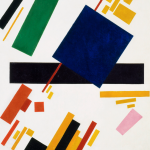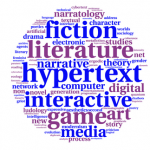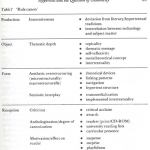electropoetics
Futures of Electronic Literature

E-lit authors Stephanie Strickland and Marjorie Luesebrink organized a panel on the "Future of E--Lit" at the ELO 2012 conference, allowing emerging and early career authors to articulate institutional and economic, as well more familiar technological, developments that constrain and facilitate current practice. The panel papers were released in ebr in March 2014. Luesebrink and Strickland followed up with comments on the papers, offering a "progress report" on the future of the field. The individual responses are available as glosses on the essays and in full here.
Iteration, you see: Floating Text and Chaotic Reading/Viewing in slippingglimpse

Crossing the tools of fluid dynamics with those of literary criticism, Gwen Le Cor casts a new light on contemporary writing in new media. Unlike first generation, "classical" hypertexts that were non-linear in the sense of using linked textual elements, Le Cor sees Strickland and Lawson Jaramillo's poem, slippingglimpse, as a more "contemporary" instance of nonlinear writing that can be viewed (literally) as a "complex, nonlinear turbulent system."
Visualising Networks of Electronic Literature: Dissertations and the Creative Works They Cite

Jill Walker Rettberg’s Visualizing Networks of Electronic Literature maps the fragmentary and dynamic field of electronic literature by analyzing citations in 44 doctoral dissertations published between 2002 and 2013. Applying “distant reading” strategies to the ELMCIP Knowledge Base, Rettberg identifies key works in the field, shifting genres, and changing approaches to scholarship.
An Emerging Canon? A Preliminary Analysis of All References to Creative Works in Critical Writing Documented in the ELMCIP Electronic Literature Knowledge Base

Scott Rettberg's essay, "An Emerging Canon?", highlights the potential for macroanalytic approaches to literary study, specifically in the field of electronic literature. Through his study of the richly populated ELMCIP Knowledge Base, Rettberg analyzes the impact that specific works have had within scholarly and creative communities, and enumerates the potential benefits that this work might have for the preservation, study, and understanding of the field.
Nature’s Agents: Chreods, Code, Plato, and Plants
In "Nature's Agents," Lisa Swanstrom discusses the agency of objects operating within networks. Specifcally, Swanstrom addresses works which allow nature to correspond with humans in a shared environment, posing provocative questions about the idea of agency itself as expressed in an ecology of action.
This essay is excerpted from Swanstrom's monograph, Animal, Vegetable, Digital: Experiments in New Media Aesthetics and Environmental Poetics (under contract to be published by the University of Alabama Press).